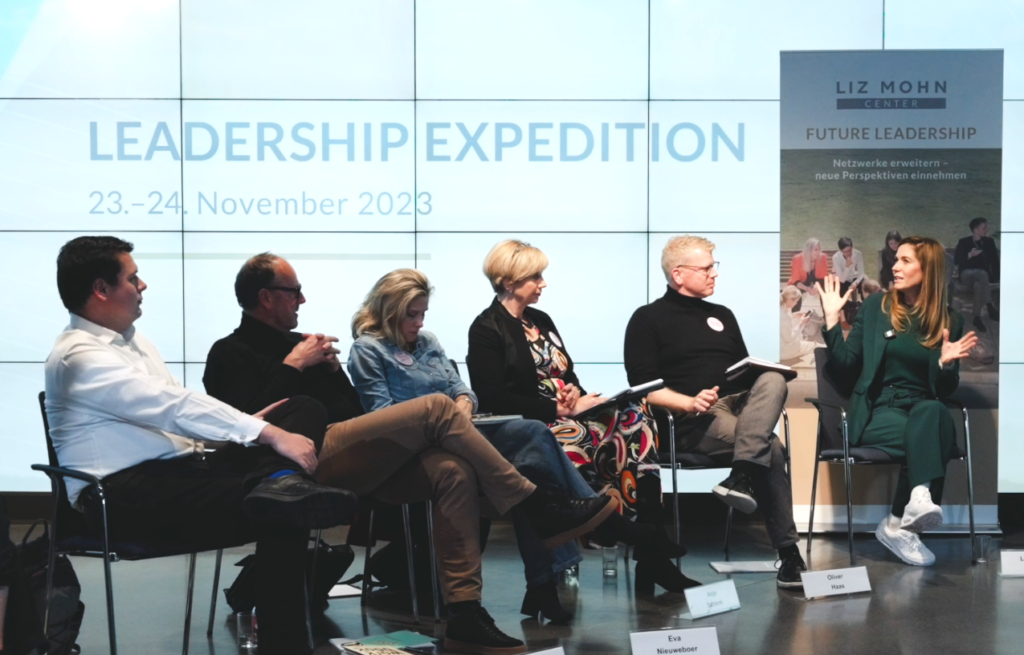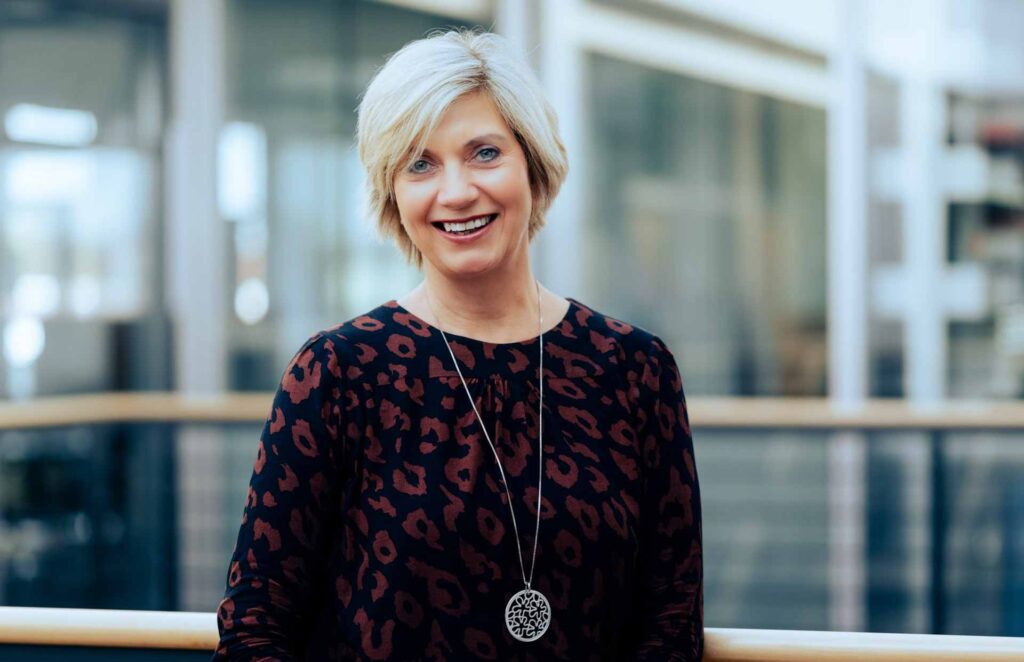Thoughtful, inspired, and energized” – that’s how a participant felt at the end of the Leadership Expedition. Leaders from business and culture embarked on an expedition into the tension field between Artificial Intelligence and Humanity. Once a year, they come together as members of the leadership network for such Leadership Expeditions. They discuss current leadership challenges, receive concrete thinking and action impulses for their leadership work, and expand their professional network.
“The double responsibility of companies: How can they succeed in doing business successfully while leaving more good than bad in the world?
Paradoxes, understood as diametrically opposed, competing demands, cannot be addressed with either-or solutions, but only with both-and approaches. Applied to current global and complex challenges, this means that organizations must continue to operate their core business profitably to ensure their future viability. At the same time, they are called upon to act for the ‘well-being of the citizens of the world society.’ In a globalized world, states alone can no longer provide this service.
Thus, organizations have a double, paradoxical responsibility. Leaders play a special role in this: they must move away from polarization and act as mediators. In terms of leadership actions, this means a more conscious engagement with the how – leaders should not stifle conflicts, decisions, or paradoxes at their inception, but should openly confront them and use them in the interest of the organization.
This is no easy task – especially since direct leadership competition with the possibilities of Artificial Intelligence is already looming. And so Oliver Haas formulated the bold thesis that generative Artificial Intelligence is already capable of replacing an average leader today.
Before AI takes over your job, someone who uses AI will take it over.” A digital expert appeals to leaders to be curious, open, and quick
Lena-Sophie Müller, Director of Initiative D21, picked up on this thread in her keynote and invited a journey through the genesis, complexity, opportunities, and potentials, but also the challenges in dealing with generative artificial intelligence. The technological leaps in recent years have become increasingly shorter: while, for example, there were still several years between the use of floppy disks and the first USB sticks, Chat GPT took only 5 days to reach 1 million people.
And Germany? Although Germany has set a gold standard in data protection with the General Data Protection Regulation (GDPR), which many countries envy, the pace of understanding and dealing with artificial intelligence is overall too slow!
One reason for this: As a member of the EU, Germany cannot independently decide on the state framework conditions required for the use of AI. An EU-wide AI Act is therefore still a thing of the future. At the same time, companies are continuously driving research and development of AI, leading to a noticeable decoupling of the state and the economy in digital transformation.
What does all this mean for leaders? Lena-Sophie Müller recommended orienting oneself with three guiding questions when dealing with AI: 1. How does it work (technical perspective)? 2. How does it impact (socio-cultural perspective)? 3. How do I use it (application-oriented perspective) to responsibly shape the handling of artificial intelligence.
Also very memorable was the statement from last year’s D21 report on the digital society: According to this, 80% of people believed that many professions would be replaced by AI by 2035. But only 19% fear that their own profession would be affected…
Leaders must definitely be aware that their own activities will change significantly – just like the activities within their “own” teams.
The Art of Leadership, Leadership of Art: The Opera is a Microcosm of Human Constellations and Challenges
Some participants left the first day with a noticeable unease: What does all this mean? Am I really replaceable as a worker? What can and must I do to not only keep up with technological developments but also use them more for my benefit? And last but not least: Do I even want all this? It was therefore a relief that the second part of the Leadership Expedition was entirely dedicated to humanity. A consciously set counterpoint, very much in the spirit of both-and. And where can humanity be better experienced than in art, here: at the Staatsoper Unter den Linden?
The participants received deep and sometimes unvarnished insights into the working world of Matthias Schulz, Director of the Staatsoper Unter den Linden. It can be stated: Martin Schulz has succeeded, with perseverance and deep human understanding, in transforming a very hierarchically led organization. While the Staatsoper was previously characterized by a culture of fear without genuine willingness to dialogue, it has now been transformed into an operation where people are not only invited but almost urged to share their perceptions and observations.
The approachable director shared not only his learning experiences with the leaders but also what the transformation process of the Staatsoper has done to him “as a person.” It was and is important to him to broaden the perspectives of the Staatsoper employees and to think more for the greater good. He wants to encourage empathy, to consider other positions, and to make the pie bigger together instead of looking at how to get the biggest piece for oneself. In doing so, he does not shy away from the big questions: Who are we? What do we want? What is important to us? In other words, Matthias Schulz urgently advises putting the collective identity of an organization to the test repeatedly
“Every human being is a miracle, let’s treat them this way!” – World-class director Peter Sellars appeals to leaders to refrain from making judgments
There are still people who captivate you without saying a word. Peter Sellars is one of them. The highly acclaimed and world-renowned theater director filled the ballet hall of the Staatsoper with a very special magic of togetherness. He spoke about his people-oriented leadership style and the great responsibility towards one’s ancestors and future generations. He recommended asking oneself every day: “Am I making a contribution today to make the world a little better?”
Sellars continued: We are all strongly influenced by evaluations, in childhood, at school, at work, in the family. But aren’t the moments in life when evaluations are left out the most important ones? Isn’t it more important to see the wonderful potential embodied in every person we deal with? We are usually conditioned to constantly criticize ourselves, on stage, in art, but also in work relationships. “Why can’t we uncover the treasure and let a person experience how special they are?” said Sellars.
For one of the participants, it was “the most significant speech of my life. I am about to become a father, and it comes at just the right moment.”
More openness to AI. But also an awareness of when human leadership is irreplaceable
Humanity is at a tipping point. Today, we have the opportunity to create a livable environment for future generations. Global challenges are complex and paradoxical, but they are human-made and can therefore also be solved by humans.
Leaders have a special responsibility: They can ask new, different questions in their organizations and create environments where ambiguity and paradox are allowed – and at the same time, they can make use of new digital possibilities. They need a keen mind, strong intuition, and a holistic view.
The realization that humanity and artificial intelligence do not have to be in contradiction but can complement each other, that both must be recognized, reflected upon, and utilized – this is a key insight from the 2nd Leadership Expedition.

